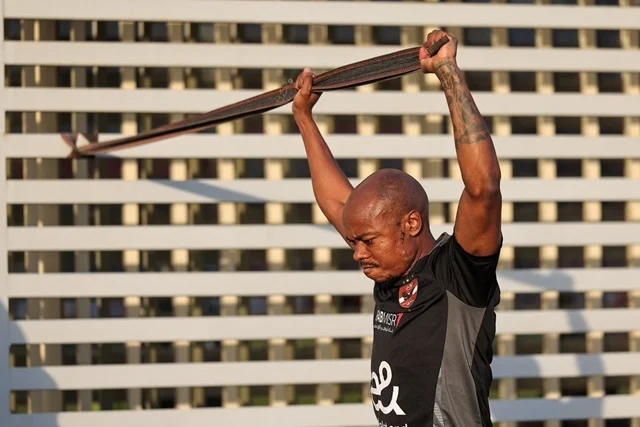Al-Ahly sporting director: “We don’t have a magic wand” for team performance

Al-Ahly Sporting Director Mohamed Ramadan has asserted that there’s no “magic wand” to instantly boost the team’s performance, instead highlighting the need for mental conditioning and contract reviews during the upcoming international break.
In an interview with “etc” television, Ramadan discussed the club’s recent challenges, noting that a dip in form is common and does not indicate player negligence.
“There are no shortcuts to improvement,” he said.
“The focus is on cultivating a winning mentality among the players, which includes psychological and social training to build resilience.”
He emphasized Al-Ahly’s investment in a psychological coach who works with players individually and as a team.
This approach, according to Ramadan, could be extended with additional staff as the club explores new ways to elevate the players’ mindset and teamwork.
Ramadan also stressed the importance of firsthand player assessment over relying solely on scout reports, advocating for a comprehensive approach to evaluating players over an extended period.
“It’s essential to observe players with their teams and understand their development holistically,” he explained.
The upcoming international break will serve as an opportunity for Al-Ahly to begin contract renewal discussions, with Ramadan noting that the futures of players like Percy Tau and Rami Rabia will be shaped by head coach Marcel Kohler’s vision.
These contract talks are expected to clarify the club’s strategy as it seeks to secure key talent while adapting to performance needs.
Addressing recent disciplinary actions, Ramadan spoke about the fine imposed on Mahmoud Kahraba.
He clarified that the penalty, reduced to 500,000 Egyptian pounds after teammates appealed on his behalf, was intended to correct Kahraba’s behavior rather than to punish him.
“The team stood by him, urging leniency, which shows their unity and support for each other,” Ramadan added.
Al-Ahly’s leadership remains committed to improving the team’s mental and physical readiness, recognizing that success comes through sustained focus and strategic planning rather than quick fixes.
Related To This Article
-
Africans Abroad
Mohamed Salah one assist away from historic Liverpool record
February 21, 2026
-
CAF Champions League
AS FAR prepares official letter to CAF and Egypt before Pyramids clash
February 21, 2026
-
Africans Abroad
Yan Diomandé assist earns RB Leipzig draw against Dortmund
February 21, 2026
-
Africans Abroad
Ibrahim Mbaye is feeling the effects of rapid rise at PSG – Landry Chauvin
February 21, 2026
-
Africans Abroad
Eric Bailly seals dramatic turnaround in Oviedo–Sociedad showdown
February 21, 2026
-
Africans Born Abroad
Alphonso Davies suffers fresh injury blow after long ACL recovery
February 21, 2026
Popular News
-

Mohamed Salah one assist away from historic Liverpool record
Feb 21, 2026 -

AS FAR prepares official letter to CAF and Egypt before Pyramids clash
Feb 21, 2026 -

Yan Diomandé assist earns RB Leipzig draw against Dortmund
Feb 21, 2026 -

Ibrahim Mbaye is feeling the effects of rapid rise at PSG – Landry Chauvin
Feb 21, 2026
-

Mohamed Salah one assist away from historic Liverpool record
Feb 21, 2026 -

AS FAR prepares official letter to CAF and Egypt before Pyramids clash
Feb 21, 2026 -

Yan Diomandé assist earns RB Leipzig draw against Dortmund
Feb 21, 2026 -

Ibrahim Mbaye is feeling the effects of rapid rise at PSG – Landry Chauvin
Feb 21, 2026
